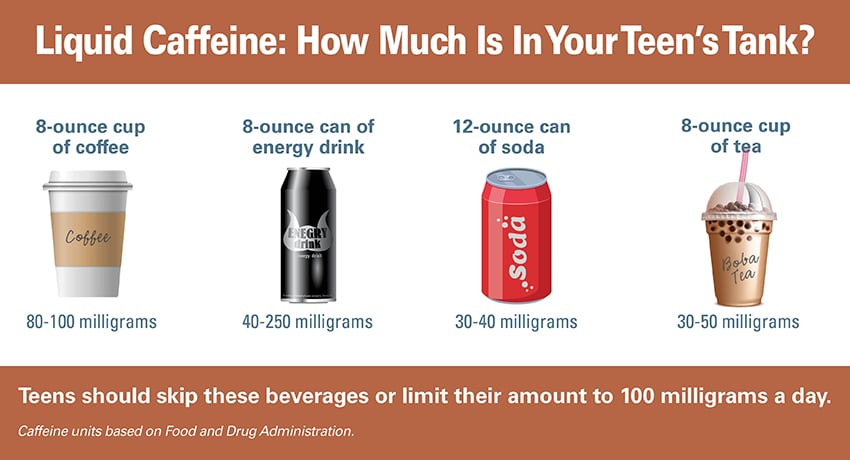Whether it comes from coffee, energy drinks, soda, or tea, the majority of teens are probably sipping too much caffeine a little too often. Their choice of beverage has shifted from previous generations, but caffeinated beverages are more popular than ever.

“Teenagers today consume less soda, but they’re taking in more caffeine from flavored coffees or energy drinks,” said Rebecca M. Beyda, MD, MS, adolescent medicine specialist with UT Physicians and assistant professor of pediatrics with McGovern Medical School at UTHealth Houston.
“Coffee and energy drinks have significantly more caffeine than soda, so it’s important to talk to your teens about caffeine and monitor the amount they drink, especially now as they return to school.”
Teens may reach for liquid caffeine to help wake up or give their brain a boost when they study. However, too much of this chemical can affect an adolescent’s physical and mental health. Mainly, high amounts can rob a young person of sleep and trigger negative side effects.
“Teenagers need more sleep than adults because they’re growing, and most of them don’t even get eight hours. Because caffeine is a stimulant, high doses can reduce the amount of sleep they receive even more,” Beyda said. “Caffeine overload can also increase blood pressure, agitation, anxiety, and behavioral issues.”
Though it is all right for adults to gulp up to 400 milligrams of caffeine per day, it is drastically less for teens under age 17 because their bodies are more sensitive to the drug. For optimal growth and overall health, it is best to limit a teen’s consumption to 100 milligrams of caffeine a day — or less!
“We actually recommend zero caffeinated beverages and zero sweetened beverages to all our patients. Water is still the best drink for optimal health, and now there are flavored and sparkling waters to pick from,” she said. “However, if a teenager has already been introduced to caffeinated drinks, watch their consumption and teach them how to read the labels and find out how much caffeine is in the drinks they buy.”
According to the Food and Drug Administration, an 8-ounce cup of coffee contains between 80 to 100 milligrams of caffeine, while an 8-ounce energy drink can pack anywhere from 40 to 250 milligrams. Meanwhile, a 12-ounce can of soda holds 30 to 40 milligrams of caffeine and an 8-ounce cup of tea has 30 to 50 milligrams.

“Depending on what they prefer, teenagers can easily reach or exceed their caffeine limit with as little as one cup or can,” the doctor said.
Older teens can consume slightly more than 100 milligrams of caffeine depending on their height and weight, but it is still best to keep their caffeine tank very low.
“It’s important to remember most girls don’t stop growing until they’re 15, and most boys don’t stop until they’re 17,” Beyda said. “The teen years are also a time for them to develop healthy lifelong habits. Tell your teenager about caffeine because health is also part of their education.
“It’s also fine to have caffeinated drinks once in a while, as a treat. However, these drinks really should be the occasional, not the regular.”


